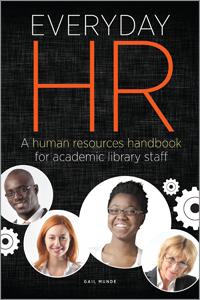Primary tabs
You don't need to be an ALA Member to purchase from the ALA Store, but you'll be asked to create an online account/profile during the checkout to proceed. This Web Account is for both Members and non-Members.
If you are Tax-Exempt, please verify that your account is currently set up as exempt before placing your order, as our new fulfillment center will need current documentation. Learn how to verify here.
- Description
- Table of Contents
- About the author
- Reviews
From the dean or director to student assistants, every academic library employee is subject to a number of complicated, confusing, and intertwined employment policies and procedures. Many of these are required by law or governed by federal or state regulations; other policies or practices are unique to an institution. Because of the complex interplay of these forces, human resources (HR) management and personnel transactions can seem almost mysterious. Munde clears the air in her new handbook, providing basic explanations and rationales for the most common and practical applications of HR management in colleges, universities and academic libraries. This handbook
- Explains the difference between a person and a position, and details the types of positions in academic libraries
- Summarizes basic employment law, highlighting key federal laws which protect employees
- Covers the dynamics of working with others, offering guidance for managing conflicts, supervising others, and conducting performance evaluations
- Provides an overview of the recruitment process, with a look at the roles of search and tenure committees
Readers will find Munde's handbook an effective atlas of the most traveled regions of the HR terrain.
List of IllustrationsPreface
Chapter 1 Positions and Position Management
The Difference between a Person and a PositionTypes of Positions in Academic Libraries
- Exempt Employees
- Tenure-Track or Tenured Library Faculty
- Librarians or Academic Professionals with Continuous Appointment
- Fixed-Term Exempt Employees
- Nonexempt Employees
- Temporary and Casual Employees
- Contractors, Consultants, Independent Service Providers, and Workers Provided by a Temporary Employment Agency
- Library Volunteers
Part-Time PositionsHow Librarians with Tenure or Faculty Status Are Unique from Teaching FacultyPosition Description and Analysis
- Position Descriptions for Exempt Employees
- Position Description for Nonexempt Employees
Principles of Position Analysis
- Compensable Factors
- Benefits of Position Review
Position ManagementSummaryReferences
Chapter 2 Basic Employment Law
Foundation and Philosophy of Work in the United StatesCommon Law Principles in Employment
- Employment at Will
- Negligent Hiring, Negligent Retention, and Defamation
- Employees' Duty of Loyalty
Key Federal Laws Protecting Employees' Rights
- Wage and Hour Laws
- Equal Opportunity Laws
- The Right to Organize
- Enforcement Agencies
Key Federal Laws Protecting Employees' Health and Safety
- Occupational Health and Safety Laws
- Workplace Hazards
- Workers' Compensation
Key Federal Laws Protecting Employees' Job Rights and Access to Health Care
- Health Insurance and Insurance Continuation
- Family Medical Leave
Key Federal Laws Protecting Employees' Private Information
- Background and Credit Checks
- Drug-Free Workplace Act of 1988
- ADA Essential Functions, Medical Exams, and Genetic Information
SummaryReferences
Chapter 3 Working with Others
Foundation and PhilosophyInfluences of Coworkers
- Coworker Support and Cohesion
- Conflict between Coworkers
Managing Conflict
- Group Conflict
- Interpersonal Conflict
Coworker Harassment and BullyingWhat and When to Tell a SupervisorSummaryReferences
Chapter 4Supervising Others
Foundation and PhilosophySupervision
- Expert Knowledge
- Interpersonal Communication
- Problem Solving
- Motivating and Coaching Others
Toxic BossesPerformance EvaluationProgressive DisciplinePersonnel Records and RetentionSummaryReferences
Chapter 5 Recruitments and Search Committees
History and PhilosophyFaculty and Professional Position Searches
- Planning the Position
- Drafting the Announcement
- Service on a Faculty or Professional Search Committee
- Administrative Review of Search Committee Recommendations
- Offer of Contract for Employment
Nonexempt or Classified Staff RecruitmentsStudent Employee RecruitmentsSummaryRecommended Reading
Chapter 6Tenure and Continuous Employment
Foundation and PhilosophyDefining Tenure (Continuous Appointment)Role of the Library Promotion and Tenure CommitteeGuidelines for Promotion and TenureCriteria for Promotion and Tenure
- Job Performance
- Research and Creative Activity
- Service
Dossier Construction and Contents
- Personnel Documentation
- Copy of the Library's Criteria for Promotion and Tenure
- Complete Curriculum Vitae
- Documentation of Job Performance
- Documentation of Scholarship
- Documentation of Service
- Other Professional Activities
- Letters from External Reviewers
Reviewing and Evaluating the Candidate's DossierBest Practices in Tenure Evaluation
- Clarity
- Confidentiality
- Consistency
- Candor
- Care
SummaryReferences
Chapter 7Concluding Thoughts
IndexAbout the Author
Gail Munde
Gail Munde is an assistant professor of Library Science at East Carolina University in Greenville, North Carolina. Prior to teaching, she worked in academic libraries for 25 years as a department chair and associate director/dean of libraries, holding positions at the University of Kansas, East Carolina University, and the University of Nevada, Las Vegas. She is a Certified Professional in Human Resources and received an MLS from Emporia State University and a PhD in Library Science from the University of North Texas.
"The entire book is very informative, but the standouts are the tables, which include a simple explanation of key federal laws protecting employees' rights, typical position status categories in academic libraries, and a performance-evaluation menu for classified staff … A good choice for any librarian looking to work in an academic environment."
--Booklist
"A very thorough, useful guide for anyone working in an academic library. From the new employee to the seasoned veteran, it is a great starting point for demystifying human resources."
--College & Research Libraries



